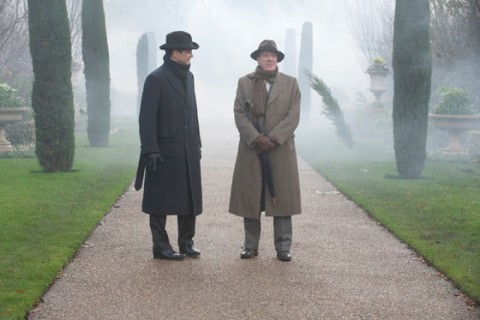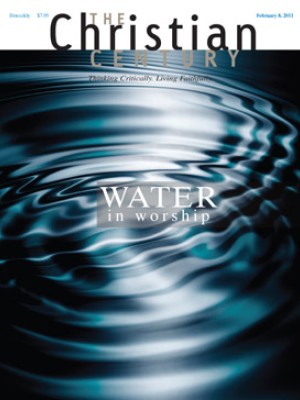Voice lessons: Learning to preach

In my second year teaching at a seminary I was assigned to teach preaching. In the third week, I was offering a less than enthusiastic response to a sermon when the student suddenly broke into tears and ran out. The class glared at me.
That day I learned that homiletics is the most difficult discipline in the seminary curriculum to teach. Anybody can teach Sanskrit or medieval theology. But preaching? When I evaluated a liturgical history student's paper with, "You don't know much about sacramental theology," this was met with barely a shrug. Who cares? But the response to my modest, "I found your last point to be unrelated to the theme of your sermon," was "How dare you say something that heartless to a nice seminarian like me?"
It isn't just that so many Protestants exalt preaching above other pastoral arts. The challenge is preaching itself. Proclaiming the gospel demands an interplay of highly developed emotional-spiritual-physical-intellectual qualities. Walking naked down Main Street while playing a harmonica is nothing compared to the personal exposure required to talk about God for 20 minutes to a group of people who have been, all week long, avoiding even the barest mention of God.
Read our latest issue or browse back issues.
An additional difficulty is the uniquely auditory nature of the Christian faith. There may be much to be said for quiet, apophatic spirituality. But Paul says that faith "comes from hearing"—through the ear, not the eye. Public, verbal testimony is the fount of all Christian belief and practice. In a culture in which words are cheap, how do we produce even a few people with the guts to witness to so strange and countercultural a gospel, which begins with, "And God said . . ."? Nobody enters the full Christian faith without the aid of a preacher. But who becomes a preacher without a skilled teacher?
These reflections were inspired by my watching the film The King's Speech, which is about King George VI of England, a miserably shy, stammering man who is thrust unwillingly onto the world stage. The movie casts the coming of World War II as a confrontation involving public speaking: Hitler's histrionic elocution is a dramatic contrast to the king's quavering, high-pitched voice. All of England awaits a reassuring royal word. George's wife, Elizabeth, slyly sets up a visit with Lionel Logue, the oddball, self-trained Australian speech therapist. "My job is to help you find your voice," Logue says to the king.
With humor and wisdom Logue goads, cajoles, threatens and berates the king, gradually finding a way to intrude into George's personal life, enticing him to relive the pain of growing up with a blowhard father and a taunting brother. He puts the king through a series of vocal calisthenics; he teaches him to curse and sing in order to overcome his stammering. The portrayal of Logue is one of Hollywood's great depictions of a master teacher, and George represents all of us who must overcome our deficiencies and speak in public.
As Barth said, "Preachers dare." During my brief and unhappy time with the U.S. Army, I was forced to jump from a parachute tower—an attempt to make me stupid enough eventually to plummet out of a plane. At the base of the tower, I attempted to explain to the sergeant my innate fear of heights and why I was unsuited to this sort of activity. He responded by grabbing me by the collar, hitting me in the face, dragging me up the stairs and kicking me over the edge of the tower. When I plopped down safely in a pile of sand I said to myself, "There, that wasn't so bad after all."
That sergeant taught me all I know about homiletical instruction. Fear of public speaking is one of the most widespread phobias. To teach someone how to preach, one must know how to hurt in the right way. King George, head of the British Empire, was terrified by the prospect of being put in front of a microphone. That's nothing compared to going head to head with the average North American congregation with nothing to aid you but three points and a poem. To say something important to a crowd of listeners, to dare to intrude into other people's souls with words, to tell them the truth that they have been assiduously avoiding—that is not a vocation for the faint of heart. Who would undertake it without external compulsion?
Preaching is so difficult that no one can do it without being summoned. Few of us preachers mount a pulpit on Sunday morning because we are naturally good at it and enjoy mouthing off before a crowd. We got put there.
Logue helped George to see that a nation desperately needed its king to say the right thing in the right way. We who are preachers speak because we have been enlisted, because no one else can say what must be said, because we are called to serve God through words.
The term servant leadership is a bit passé for clergy, but The King's Speech renders King George as an exemplar of such leadership. You can't pay someone enough to stand up and speak a nation into war, nor can you afford what it truly costs for someone to stand up in front of God's people and expound on John 2. A preacher must be forced into such daring servitude. Therefore a teacher of preaching must help a budding preacher name the theological compulsion under which he or she speaks. In my experience, this is what a developing preacher means by saying, "I'm still attempting to find my own voice." It means: I'm learning to embrace why God called someone like me to say truth like this to people like these.
As king, George was forced to read aloud other people's words as if they were his own. We preachers speak not because we need to get something off our chests but because God wants to say something to God's people. Sometimes I'm invited to "just share what's on your heart." Alas, as an ordained spokesperson for the gospel, I'm not free to engage in such self-indulgence. Left to my own devices, I might say what I'm really thinking—but the church could care less about what I'm thinking. The pressing question: "Is there any word from the Lord?"
The King's Speech reminded me what a high vocation it is to enable others to find their voice in service to a God who uses our weakness to bring God's gospel to speech. I preach today as the recipient of Lionel Logue-like instruction. One spring afternoon at Yale Divinity School I confessed to my teacher, Bill Muehl, that I was self-conscious about my thick southern accent, which everyone in New Haven seemed compelled to note and ridicule. "You can make good money in Texas with that accent," Muehl assured me.
When I told him I had no intention of preaching in Texas, Muehl said, "Pity," and then handed me a stack of reel-to-reel tapes. "Listen to these," was his only instruction, "they are some of the greatest preachers of our time."
I took the tapes back to my dorm room and spent the rest of the day listening to sermons by Harry Emerson Fosdick, William Sloane Coffin and Halford Luccock. Immediately I noted that none of these great preachers possessed a great voice—all of them had odd speech quirks and vocal weaknesses. I got the point: as in the Bible, God tends to call the "wrong" people, without a surfeit of gifts, to do God's work.
Fosdick in particular made me laugh, with his high-pitched, nasal twang. But I couldn't stop listening. Fosdick must have had something really important to say, I thought, for why else would a guy who sounded like that be speaking in public? I thought: I may not have the best voice in the world, but it's as good as Harry Emerson Fosdick's! That day I became a preacher.
As Paul says, God demonstrates God's power in our weakness. In speaking up to smooth-talking Hitler, faltering, stammering King George demonstrated a peculiar power. But for any of that to happen, God needed someone to help the king find his voice. This is the difficult and holy vocation of the teaching of preaching.





